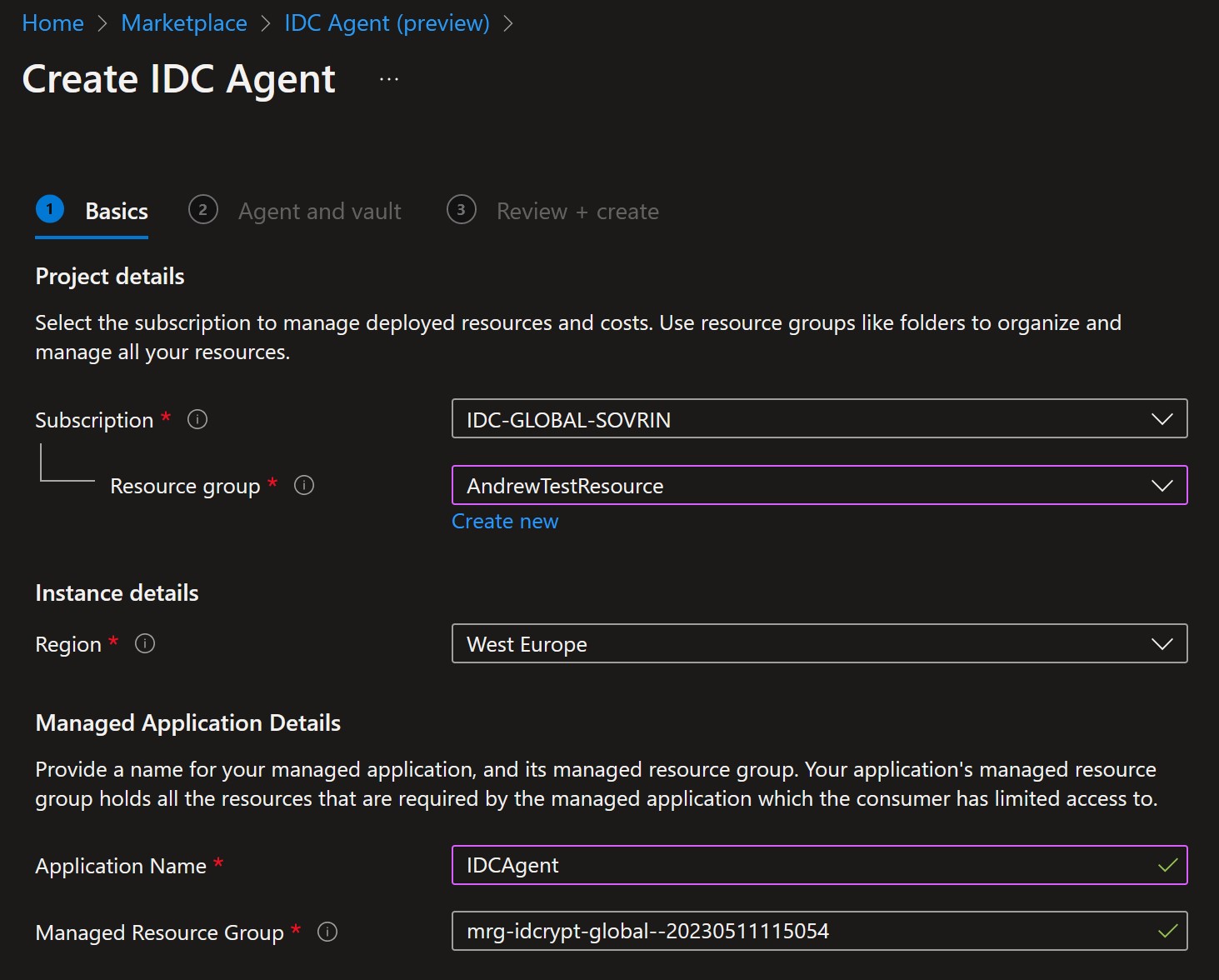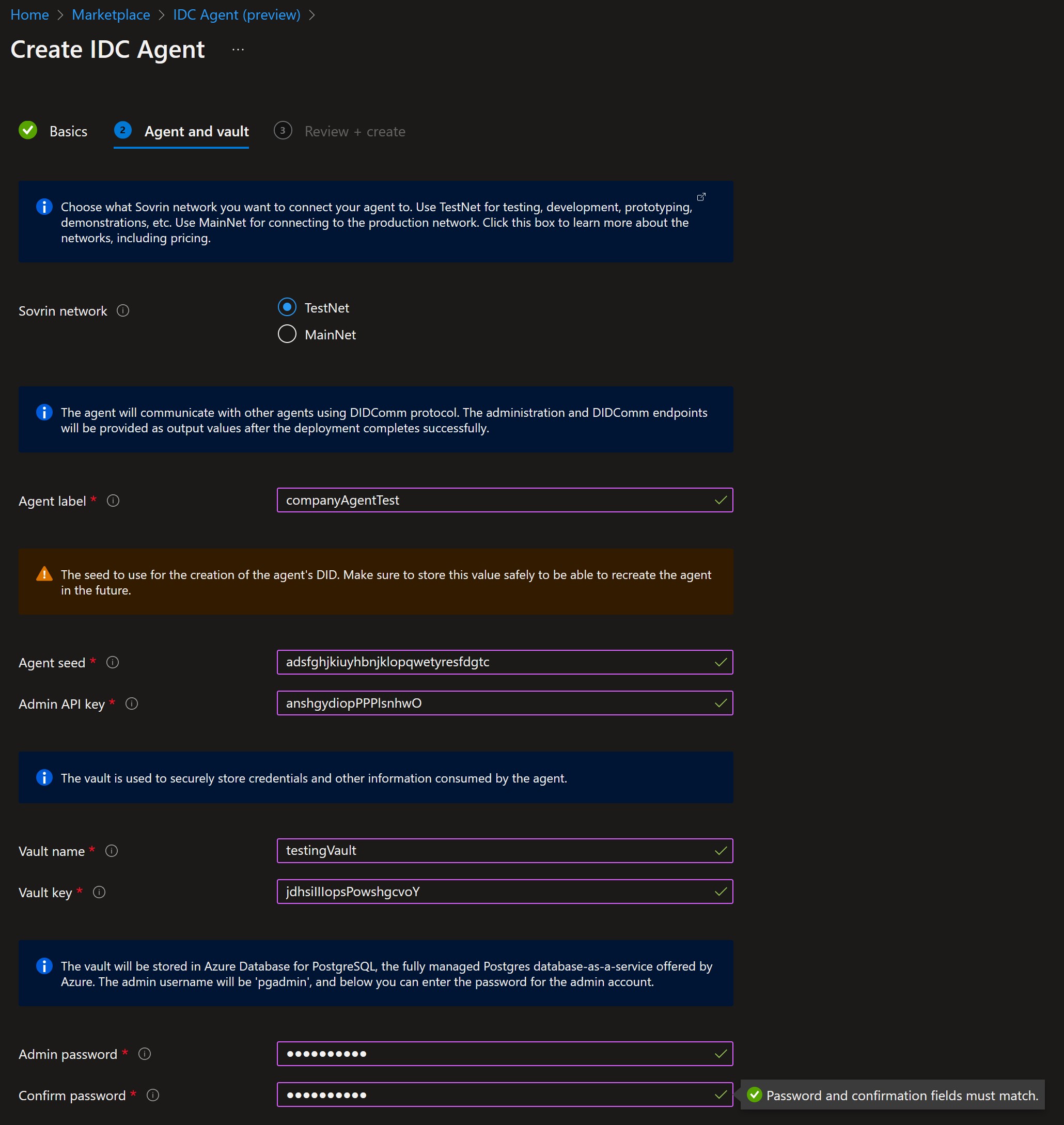
IDC Agent Installation
Select the edition that's right for your business
There are 4 editions of the IDC Agent to choose from, each enables developers to build out, or utilise, decentralized digital identity services that leverage verifiable credentials. The 4 available editions are:
· Community
· Standard
· Business
· Enterprise
ID Crypt Global is committed to the Self-Sovereign Identity (SSI) ecosystem, and as such, each IDC Agent edition is fully compatible with the Hyperledger Aries Cloud Agent Python (ACA-Py). This compatibility ensures that all IDC Agents can be used as part of the wider SSI community and ecosystem built around ACA-Py.
Managed Agent
All editions of the IDC Agent deliver a managed Self-Sovereign Identity (SSI) Cloud Agent, that is fully compatible with the Aries Cloud Agent Python (ACA-Py). All editions can scale on demand and equally important, scale down when demand is no longer required.
Updates to the agent are made available by ID Crypt Global removing the need to maintain the IDC Agent or versions of an ACA-Py Cloud Agent.
Mediator Service
The IDC Agent can be used in Mediator scenarios using core protocols to coordinate its mediation role. In such cases, the IDC Agent will receive, store and forward messages to agents that typically lack an addressable endpoint, such as those found within mobile device application (e.g. The ID Crypt Vault Application for mobile devices).
Scaling and High Availability.
The IDC Agent is a highly scalable agent, leveraging Microsoft Azure elastic scale capabilities at its core. Scale is delivered in a horizontal fashion, scaling to meet customer demands. As part of its scalaing capabilities, the IDC Agent will automatically scale on demand and equally as import, scale back down when customer demands/loads decline.
Each IDC Agent has been configured and built to be highly robust. The IDC Agent follows a High Availability model deploying back end infrastructure across 3 Azure Availability Zones. Note that an Availability Zone is infrastructure that is distributed geographically from another zone, typically this is some 10-40km apart in distance. When deploying your IDC Agent, check the region in which you wish to deploy for Azure Availability Zone capabilities.
Please note that the IDC Agent is not currently supported for multi-tenant type implementations.
IDC Agent web portal controller
The Standard Business and Enterprise Editions of the IDC Agent come complete with an IDC Agent Web Portal Controller. This controller exposes a simple user interface that can be used to interact with the IDC Agent, delivering identity service capabilities through a simple user interface. The same UI can be used to interact with the wider Self-Sovereign Identity (SSI) community and all SSI based services/solutions.
Please note, the controller exposes different capabilities based on the installed IDC Agent Edition.
The Controller can be used in some cases as an “out of the box” tool providing some businesses with all the functionality they may require. However, for other scenarios, the controller may be used to verify API usage/expected outcomes as the business focusses on its own controller / integration applications.
Community Edition
The Community Edition is ideal for developers or businesses looking to get started on their journey with SSI. The Community Edition is an ultra-low-cost edition and can be used along with any ACA-Py demonstrations, get started guides, and examples.
The IDC Agent Community Edition provides:
A fully managed Self-Sovereign Identity (SSI) Cloud Agent that is fully compatible with the ACA-Py Cloud Agent
The ability to join and interact with the wider SSI community.
The ability to integrate core systems with SSI services and service providers.
The ability to build your own identity solutions and applications.
Access to both a Test and Production environments
Some other aspects to be aware of when selecting the Community Edition. ID Crypt Global provides limited support for the Community Edition, restricted to within UK working hours.
Standard Edition
The Standard Edition incorporates all the features available within the Community Edition, and builds upon these by adding:
A Public DID (Decentralised Identity) registration for your company
Listing on the ID Crypt Global DID directory
A complete Risk profile that is associated with your company
A risk profile association with your companies digital identity, enables your business to access certain additional services from third parties. A good example is access to financial products provided by banks and other various regaulted providers.
An ESG (Environment Social Governance) capability
Apply for your own IDC Sustainability Credential (ESG Rating)
Gain transparency into your organisations ESG ratings
Use your company digital identity coupled with ESG rating to access other services, such as access to additional capital, liquidity or investment
Be able to put forward your business for certain supply chains where ESG ratings are required
Receive quarterly IDC Sustainability Credentials
Discover other businesses via the ID Crypt Global DID directory
Verify other organisations credentials and identity
Enjoy access to an IDC Agent web portal for ease of use and non API integration
Business Edition
The business edition incorporates all the features available within the Standard Edition, and builds upon these by adding:
Access to third party providers web applications (ESG providers for example)
Know-Your-Customer (KYC) protocol
Used for in depth and enhanced due diligence capabilities
Request identity proofs with additional attachments
Make requests for unstructured data that is to be used for enhanced due diligence purposes
Accelerate DD and KYC to a matter of moments
Ability to review and subscribe to third party (customer/provider) risk profiles.
Incorporates Sanctions Screening against all government watchlists.
Global risk insight
QA guided and assured by risk experts.
PEP identification
RCA identification
Adverse media screening (AML), 150m articles per month for over 200+ Countries and territories
All risk profiles are monitored every 15 minutes.
Secure Agent push messaging
Enterprise Edition
The Enterprise Edition incorporates all the features available within the Business Edition, and builds upon these by adding:
Access and license to use the Patented DPKIps security solution
Decentralized Public Key Infrastructure technology and business processes (replaces a typical PKI)
Used to secure critical infrastructure and sensitive content
Secure bi-lateral messaging
Dedicated direct communications path (peer-to-peer)
Ability to send both structured and unstructured content along with attached files.
Suitable for carrying highly private messages, including those related to financial transactions (MT messages, ISO20022 formats can all be used)
Remote customer verification (e.g. over the phone/additional web verification)
Access to ID Crypt Global sponsorship services (transaction endorsing)
The ability to define your own credential schemas.
The ability to define your own credential definitions.
The ability to issue digital identity credentials against any of your own credential definitions.
IDC Agent Installation from Azure Marketplace
Locate the Azure Marketplace from within your Microsoft Azure Portal. You can also “search” for the Marketplace by entering in the search toolbar located at the very top of the Azure portal. Simply search “Marketplace”.
Once within the Azure Marketplace, search “IDC Agent”. Select the product provided by “ID Crypt Global Limited”.
Select from the Plan dropdown menu, the Edition you wish to install. Now press create.
You will now be required to complete some basic configurations that will be applied to the IDC Agent deployment.

Basic Information
Subscription: Select the subscription in which you wish to deploy.
Resource group: It is recommended to create a new resource group for your IDC Agent deployment, however, you may also select from an existing resource group if you would prefer to.
Instance details, Region: Select the Azure geographic region in which you wish the IDC Agent to be deployed. It is recommended to select a region that is linked, or most closely related to your companies legal jurisdiction.
Application Name: Provide a name for your IDC Agent.
Managed resource group: This will be pre-populated; it is recommended to simply accept the default. A new name can be provided if desired.

Agent and Vault
The Agent and Vault section of your installation refers to specific configuration of your IDC Agent instance, and how you wish to access it.
Please note, there are some configuration information that should be treated as highly sensitive, and should therefore be stored securely within a service such as Azure Key Vault.
Sovrin Network: The IDC Agent can be deployed to communicate with TestNet or MainNet infrastructures. It is recommended for exploration activities/development activities to select the TestNet infrastructure. Please note that TestNet is subject to periodic re-sets, in which case ledger entries such as Verifiable Scehema and Credential definitions will be lost along with any Public DID registration.
Please only select MainNet for deployments that are ready for production/live use.
Agent Label: Each IDC Agent should have a label associated with it. The label can be any friendly name you wish for your IDC Agent instance.
Agent Seed: The Agent Seed is used to create a set of unique starting points. The seed for example is used to help generate the IDC Agents own internal (initial) DID (Decentralized Identity). If you wish to re-create an IDC Agent instance in the future with the same DID information, then please make note of the Agent seed and keep it securely stored, ideally within a service like Microsoft Azure Key Vault.
The Agent Seed must be 32 characters long and consist of only alphanumeric.
Admin API Key: This is a security key used to secure the exposed IDC Agent API. The key must be passed by calling clients in the HTTP header using “X-API-Key”. It is recommended that this key is securely stored within a service such as Microsoft Azure Key Vault.
Vault Name: Create a name for the IDC Agent Vault. This can be the same as the label used or something unique.
Vault Key: A unique key used to “open the vault”. It is recommended to select a vault key that is of 32 characters long and contains only alphanumeric. It is recommended that this key is securely stored within a service such as Microsoft Azure Key Vault.
Admin password: The IDC Agent uses PostgreSQL, an admin password can be set here. The Password must be at least 8 characters long, contain at least one uppercase letter, one lowercase letter, one number, and one special character
Review and Create
Prior to deployment taking place, you have an opportunity to review the configuration you have applied to the IDC Agent and where it is to be deployed. If you are happy with your configuration, proceed to “Create” your IDC Agent.
Completion, Parameters and Outputs
Once completed, your IDC Agent will be available within your configured resource group within your Azure tenant. You may browse to the resource group to locate your IDC Agent. Your IDC Agent is now available to use.
Parameters
If you browse to your now installed IDC Agent via the Resource Group that you selected to have it deployed within, you can select the Parameters and Outputs menu option, available under settings.
The parameters will show you information such as the IDC Agent deployed location, the Sovrin Network that your agent is connected to and other parameters passed when creating your instance.
Outputs
The outputs section provides information on key configurations of the IDC Agent.
DIDCommEndPoint: This provides the URL of how other agents can communicate with the installed IDC Agent via the DIDComm Protocol.
AdminEndPoint: This is the IDC Agents API endpoint. You can access your IDC Agents API Swagger documentation by pasting the contents of this field in the address bar of your web browser. You will be prompted for the API Key - which was set as an installation parameter. You may access this value from the Parameters Settings. The API is how the IDC Agent can be interacted with programmatically.
AgentDID: This is the deployed IDC Agent decentralized identity (DID). This is a private DID unless it has been writted to the underlying Sovrin Blockchain. This requires sponsorship services from ID Crypt Global. Once a DID is written to the underlying blockchain it is an identity that is owned by this IDC Agent instance forever.